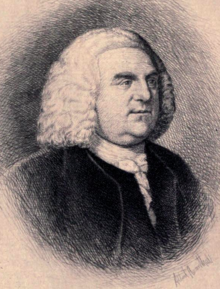William Allen (loyalist)
| William Allen | |
|---|---|
 |
|
| Born | August 5, 1704 Philadelphia, Pennsylvania |
| Died |
September 6, 1780 (aged 76) Mount Airy, Pennsylvania |
| Occupation | Merchant, Jurist |
| Spouse(s) | Margaret Hamilton |
William Allen (August 5, 1704 – September 6, 1780) was a wealthy merchant, attorney and Chief Justice of the Province of Pennsylvania, and mayor of Philadelphia during the colonial period. At the time of the American Revolution, Allen was one of the wealthiest and most powerful men in Philadelphia. A Loyalist, Allen agreed that the colonies should seek to redress their grievances with British Parliament through constitutional means, and he disapproved of the movement toward independence.
He built a manor and country estate, known as Mount Airy, in 1750 outside Philadelphia; the neighborhood became known by his estate's name and is now part of the city. In 1762 he founded what became Allentown, Pennsylvania, and had a hunting lodge there.
Born in Philadelphia in 1704, Allen was the son of William Allen, Sr., a successful Philadelphia merchant of Scots-Irish descent, who had immigrated to America from Dungannon, County Tyrone, Ireland, with his brother, John, and father. The elder Allen had risen to prominence through close ties to William Penn, the proprietor of Pennsylvania.
As a youth, Allen spent much of his time in England for his education and refinement. In 1720, he was admitted to the Middle Temple in London to study law, and at the same time became a pensioner at Clare College, Cambridge.
Upon his father's death in 1725, Allen returned to Philadelphia to manage the family's business interests. In the spring of 1729, Allen was named alongside lawyer Andrew Hamilton (his future father-in-law) as a trustee for the purchase and building fund to develop the state house in Philadelphia, then the capital of the province. Both men were authorized to buy the land for the project. By October 1730, the next year, Allen and Hamilton began to purchase lots on Chestnut Street at their own expense, the property on which the Pennsylvania State House (later known as Independence Hall), was to be built. In 1735, Allen was appointed as mayor of the city of Philadelphia. The next year, he celebrated the opening of the nearly complete State House by having a feast for all residents and guests of the city; it was described at the time as "the most grand, the most elegant entertainment that has been made in these parts of America."
...
Wikipedia
